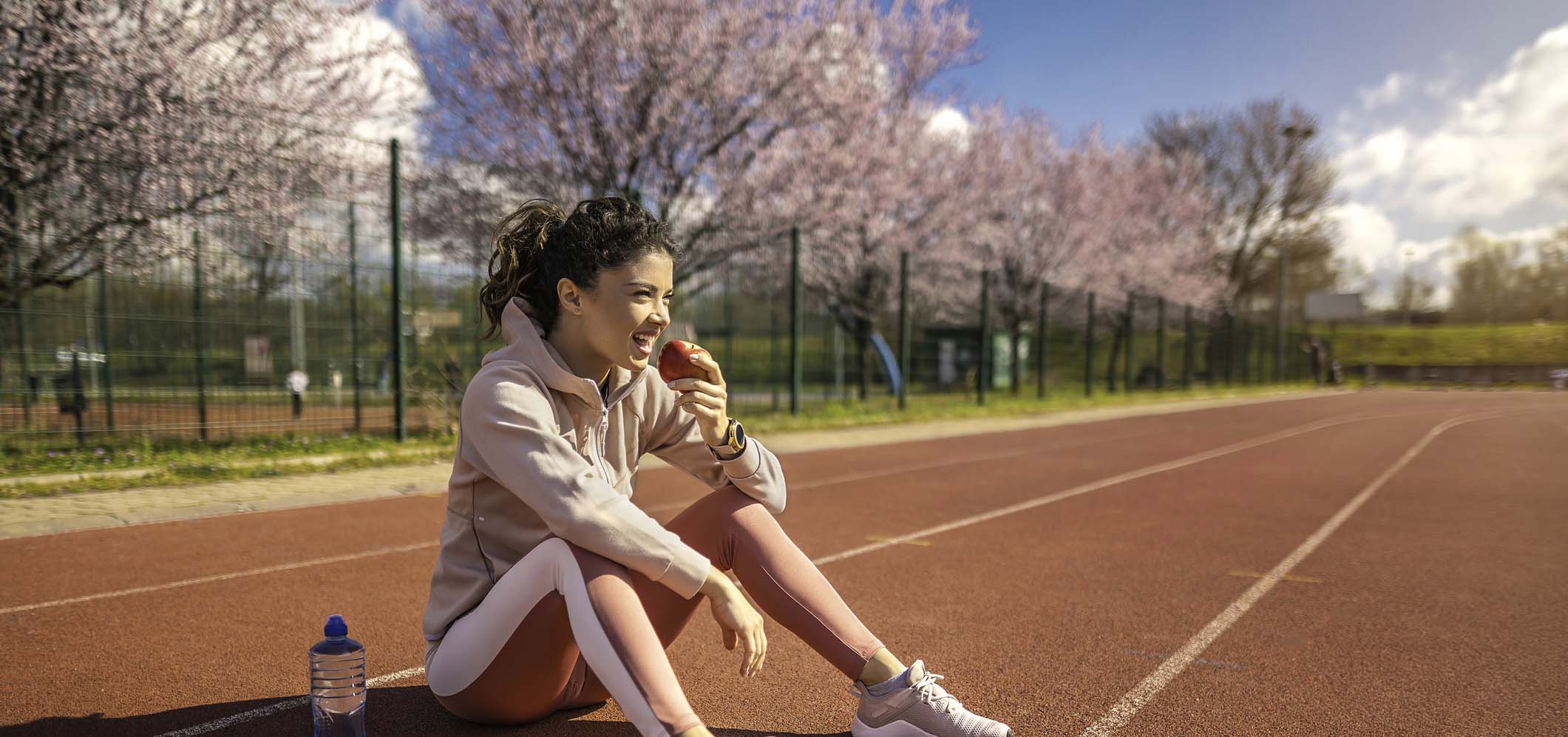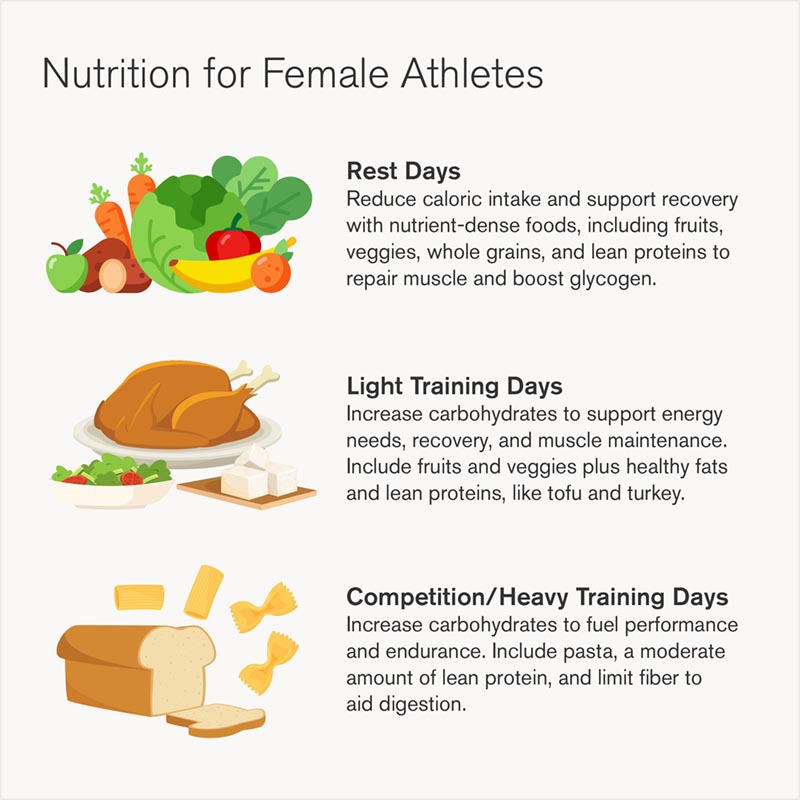Nutrition for Female Athletes: Strategies for Peak Performance
March 15, 2024
Categories: Women's Health, Sports Medicine, Orthopaedics
 By Haemi Choi, MD, Orthopaedic Sports Medicine
By Haemi Choi, MD, Orthopaedic Sports Medicine
Trying to achieve peak athletic performance and optimal health is a complicated journey, with nutrition playing a pivotal role. For female athletes, the importance of diet cannot be overstated, as it directly influences energy levels, recovery, and overall well-being. Women have unique nutritional needs that should be considered when trying to maintain and enhance performance. It's important to understand the fundamentals of sports nutrition, the impact of physiological differences, and practical tips for incorporating these strategies into your daily life.
We spoke with Haemi Choi, MD, a primary care sports medicine physician, to learn about nutrition for female athletes.
"The big difference between female and male athletes is the sex hormones which affect body composition and performance. When we talk about hormones, one thing that we mention is menstrual cycles. It can affect those micronutrients in athletes, particularly if a female athlete has infrequent menstrual cycles or heavy menstrual cycles," says Dr. Choi.
What are the unique nutritional challenges of female athletes?
At the core of sports nutrition for female athletes are the macronutrients: carbohydrates, proteins, and fats. Each plays a crucial role in athletic performance and recovery. Carbohydrates serve as the primary energy source, particularly important for high-intensity training and endurance sports. Proteins are essential for muscle repair and growth, while fats provide a concentrated energy source and are vital for hormonal health. Beyond macronutrients, micronutrients and hydration also help maintain health and optimize performance.
Female athletes face distinct challenges and considerations when it comes to balancing appropriate nutritional needs with energy used during exercise. Energy availability is the amount of energy available for your body function’s after the energy used for exercise is subtracted from the energy you take in from food.
One condition important to screen for in female athletes is relative energy deficiency in sport, also known as RED-S. This condition can occur when an athlete does not get enough fuel to support the energy demands needed for daily life and training. Failure to reach energy balance or conditions of prolonged low energy availability can lead in increased risk of injury, illness, and weight loss. In females, low energy availability (EA) can affect the following including:
- Menstrual cycle impact: Fluctuations in estrogen levels from low EA can lead to irregular or lack of menstrual cycles.
- Bone health: When estrogen levels decrease due to lack of energy availability, it can cause weakening of bones. Conditions such as stress fractures, osteopenia, and osteoporosis can occur. Supplementation with calcium and vitamin D can help maintain strong bones.
- Healthy weight: Adequate energy intake through a balanced diet is essential. Inadequate energy input can lead to disordered eating and nutritional deficiencies.
"If a female athlete has a heavier menstrual cycle and I'm concerned they may have iron deficiency anemia, I do recommend iron supplementation. Symptoms may include fatigue, low energy, weakness, or declining performance in sport. In those cases, I will check blood work including a complete blood count, ferritin and iron levels to confirm. One common supplement I recommend is slow-absorbing iron as it causes less gastrointestinal side effects than regular iron," says Dr. Choi.
What are the energy and nutrition requirements for female athletes?
Energy requirements for female athletes vary based on several factors, including the type of sport, training intensity, body composition, and age. However, there are general recommendations that are applicable to many women.
Recommendations for caloric intake vary depending on the intensity and length of exercise, but ideally the target should be at 45 kcal kg fat free mass/day.
To meet this requirement, before a workout, consume the right balance of carbohydrates and proteins to help fuel the body and enhance athletic performance. Some good options an hour before exercising include a smoothie with fruit and protein powder or a turkey and avocado sandwich. If you're limited on time, eat a banana or granola bar 15 minutes before exercise.
After you've finished breaking a sweat, focus on carbohydrates to replenish glycogen stores and proteins to aid in muscle repair, both of which are crucial for recovery and preparation for the next training session.
"The energy requirement for a female athlete depends on the sport. Gymnastics, ballet or even distance runners emphasize being lean and not having a lot of body fat. What can happen is they don't get enough energy input to support their exercise level. So it's important to make sure that they're getting enough energy availability to be able to support their activity level," says Dr. Choi.
Athletic nutrition for a vegetarian or vegan diet
Many women follow certain diets that meet their personal or nutritional goals, such as vegetarianism or veganism. While adopting plant-based diets can meet the nutritional needs of female athletes, careful attention needs to be paid to protein intake and micronutrients such as iron, vitamin D, calcium, and vitamin B12. Women who don't eat meat may struggle to fill caloric, protein or other nutrient goals if they don't plan their meals in advance.
Supplements may be necessary to fill any nutritional gaps. While some supplements like creatine, beta-alanine, and caffeine have evidence-based benefits, it's essential to approach performance enhancers with caution, understanding the risks and adhering to regulations governing their use in sports.
"With vegan diets, some women may not get all the necessary micronutrients in their diet. They also may not focus on getting enough quality protein intake. Some examples of food high in protein include seitan, tofu, edamame, lentils, hemp seeds, oats, along with vegetables and fruits such as sweet potatoes and bananas," recommends Dr Choi.

How to plan meals in advance to meet athletic nutrition goals
For female athletes, tailoring nutrition to the body's demands on rest days, light training days, and competition days is key to optimizing performance and recovery.
For rest days, focus on nutrient-dense foods that support recovery while slightly reducing caloric intake to match lower energy expenditure. Meals should be rich in fruits, vegetables, whole grains, and lean proteins to aid in muscle repair and replenishment of glycogen stores.
On light training days, athletes should increase their carbohydrate intake to support energy needs without drastically exceeding daily caloric requirements. Including moderate amounts of healthy fats and maintaining high protein intake can also support ongoing recovery and muscle maintenance.
Competition days or heavy training sessions demand a higher intake of carbohydrates to fuel performance and endurance. Pre-event meals should be consumed 3-4 hours before activity to allow for digestion and should be high in carbohydrates, moderate in protein, and low in fat and fiber to minimize gastrointestinal discomfort.
Here are sample meal plans to get started:
Rest days:
- Breakfast: Greek yogurt with mixed berries, a drizzle of honey, and a sprinkle of chia seeds.
- Lunch: Quinoa salad with roasted vegetables, chickpeas, feta cheese, and a lemon-tahini dressing.
- Snack: Sliced apple with almond butter.
- Dinner: Grilled salmon, a side of steamed broccoli, and sweet potato wedges.
Light training days:
- Breakfast: Oatmeal topped with banana slices, walnuts, and a dash of cinnamon.
- Lunch: Turkey and avocado wrap with whole-grain tortilla, mixed greens, and tomato.
- Snack: Cottage cheese with pineapple chunks.
- Dinner: Stir-fried tofu with a variety of vegetables (bell peppers, snap peas, carrots) over brown rice.
Competition days:
- Breakfast: Smoothie made with spinach, blueberries, banana, protein powder, and almond milk.
- Lunch: Chicken breast with quinoa and a side salad dressed with olive oil and vinegar.
- Snack: Energy bars or gels, depending on personal preference and sport-specific requirements.
- Dinner: Pasta with marinara sauce, lean ground beef, and a side of green beans.
Common concerns facing female athletes
Female athletes can face specific challenges, such as managing weight in a healthy manner, dealing with gastrointestinal issues during training, and overcoming food and body image issues. Implementing strategies like focusing on nutrient-dense foods, rather than calorie counting, can support a healthy weight management approach. For gastrointestinal comfort, experimenting with meal timing and composition before competitions can identify what works best for an individual's body.
Professional counseling and support groups can be invaluable for athletes struggling with body image issues. They provide strategies and support to foster a healthy relationship with food and self-image. Individualized nutrition plans can address unique dietary needs, optimize athletic performance, and manage health issues. A dietitian specialized in sports nutrition for female athletes can provide tailored advice that considers your training schedule, performance goals, and any dietary restrictions or preferences.
If you're looking for specialized support, the women's sports medicine program at Loyola Medicine provides nutrition expertise tailored to the needs of each patient. Our nutrition team collaborates with other clinicians including doctors, nurses, speech therapists and social workers. All patients are screened for possible nutritional deficiencies, to ensure they receive the best treatment and to immediately address problems.
Dr Haemi Choi is a primary care sports medicine physician who works with athletes at the high school, collegiate, and professional levels. Her medical interests include non-surgical sports medicine, rehabilitation of athletes back to sport after injury, integrative medicine, and women's sports medicine.
Book an appointment today to see Dr. Choi or another of Loyola Medicine's specialists by self-scheduling an in-person or virtual appointment using myLoyola.
